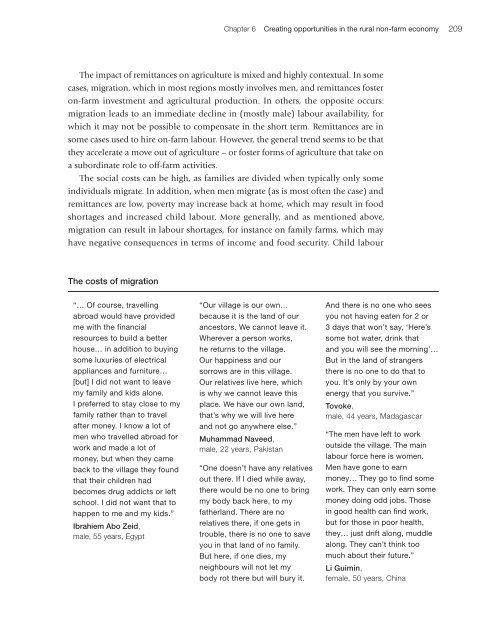English - IFAD
English - IFAD
English - IFAD
Create successful ePaper yourself
Turn your PDF publications into a flip-book with our unique Google optimized e-Paper software.
Chapter 6 Creating opportunities in the rural non-farm economy 209<br />
The impact of remittances on agriculture is mixed and highly contextual. In some<br />
cases, migration, which in most regions mostly involves men, and remittances foster<br />
on-farm investment and agricultural production. In others, the opposite occurs:<br />
migration leads to an immediate decline in (mostly male) labour availability, for<br />
which it may not be possible to compensate in the short term. Remittances are in<br />
some cases used to hire on-farm labour. However, the general trend seems to be that<br />
they accelerate a move out of agriculture – or foster forms of agriculture that take on<br />
a subordinate role to off-farm activities.<br />
The social costs can be high, as families are divided when typically only some<br />
individuals migrate. In addition, when men migrate (as is most often the case) and<br />
remittances are low, poverty may increase back at home, which may result in food<br />
shortages and increased child labour. More generally, and as mentioned above,<br />
migration can result in labour shortages, for instance on family farms, which may<br />
have negative consequences in terms of income and food security. Child labour<br />
The costs of migration<br />
“… Of course, travelling<br />
abroad would have provided<br />
me with the financial<br />
resources to build a better<br />
house… in addition to buying<br />
some luxuries of electrical<br />
appliances and furniture…<br />
[but] I did not want to leave<br />
my family and kids alone.<br />
I preferred to stay close to my<br />
family rather than to travel<br />
after money. I know a lot of<br />
men who travelled abroad for<br />
work and made a lot of<br />
money, but when they came<br />
back to the village they found<br />
that their children had<br />
becomes drug addicts or left<br />
school. I did not want that to<br />
happen to me and my kids.”<br />
Ibrahiem Abo Zeid,<br />
male, 55 years, Egypt<br />
“Our village is our own…<br />
because it is the land of our<br />
ancestors. We cannot leave it.<br />
Wherever a person works,<br />
he returns to the village.<br />
Our happiness and our<br />
sorrows are in this village.<br />
Our relatives live here, which<br />
is why we cannot leave this<br />
place. We have our own land,<br />
that’s why we will live here<br />
and not go anywhere else.”<br />
Muhammad Naveed,<br />
male, 22 years, Pakistan<br />
“One doesn’t have any relatives<br />
out there. If l died while away,<br />
there would be no one to bring<br />
my body back here, to my<br />
fatherland. There are no<br />
relatives there, if one gets in<br />
trouble, there is no one to save<br />
you in that land of no family.<br />
But here, if one dies, my<br />
neighbours will not let my<br />
body rot there but will bury it.<br />
And there is no one who sees<br />
you not having eaten for 2 or<br />
3 days that won’t say, ‘Here’s<br />
some hot water, drink that<br />
and you will see the morning’…<br />
But in the land of strangers<br />
there is no one to do that to<br />
you. It’s only by your own<br />
energy that you survive.”<br />
Tovoke,<br />
male, 44 years, Madagascar<br />
“The men have left to work<br />
outside the village. The main<br />
labour force here is women.<br />
Men have gone to earn<br />
money… They go to find some<br />
work. They can only earn some<br />
money doing odd jobs. Those<br />
in good health can find work,<br />
but for those in poor health,<br />
they… just drift along, muddle<br />
along. They can’t think too<br />
much about their future.”<br />
Li Guimin,<br />
female, 50 years, China

















